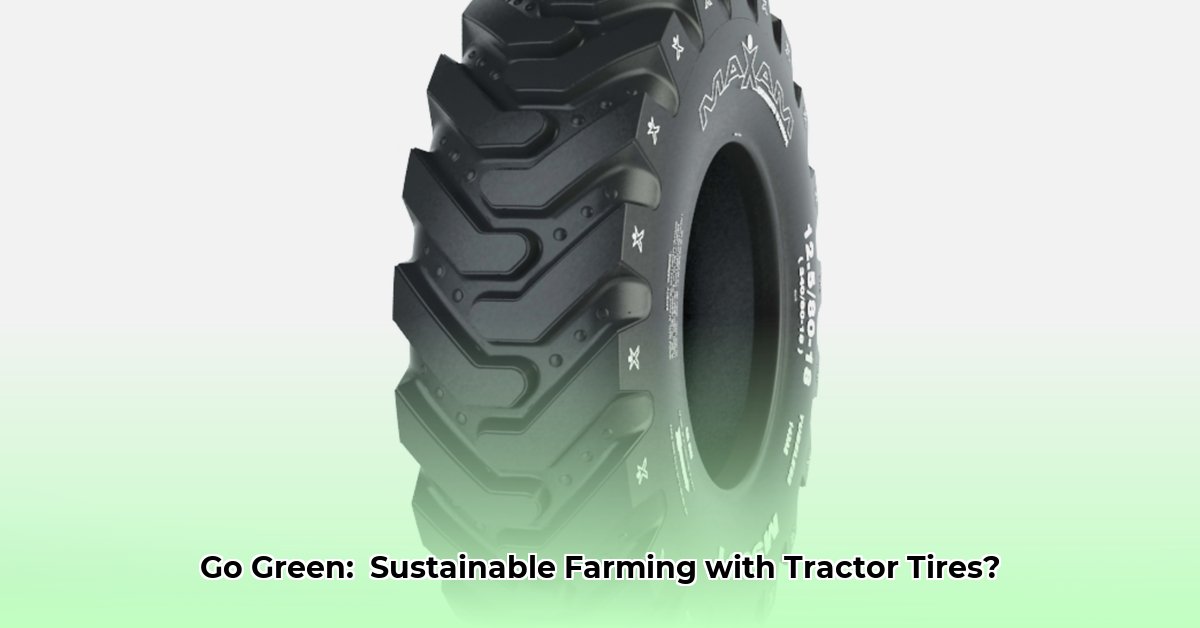
12.5/80 x 18 Tractor Tires: A Sustainability Imperative
Choosing the right tractor tires significantly impacts farm efficiency and environmental responsibility. This article examines the 12.5/80 x 18 tire segment, its sustainability challenges, and opportunities for eco-friendly innovation. We'll analyze current market offerings, explore impactful sustainability considerations, and provide actionable recommendations for key stakeholders. Isn't optimizing both farm productivity and environmental stewardship a worthwhile goal? For more on tractor tire sizes, see this helpful guide: Tractor Tire Sizes.
Market Overview: A Niche with Untapped Potential
The 12.5/80 x 18 tire market, while smaller than larger tire segments, represents a significant opportunity for sustainable innovation. Precise market size data is limited, reflecting a broader deficiency in comprehensive research regarding sustainable tire options in this size. This lack of readily available data presents a challenge to fully understanding the potential market impact for eco-friendly tires. However, the growing awareness of sustainable agriculture practices suggests substantial growth potential. The question remains: How do we effectively tap into this potential?
Sustainability Considerations: The Full Tire Lifecycle
Tire manufacturing is energy-intensive, often relying on non-renewable resources. The disposal of worn-out tires poses another environmental challenge, contributing to landfill waste and potential soil and water contamination from microplastics. Isn't there a better way to manage this lifecycle? One approach involves focusing on extending the lifespan of tires through robust design and careful usage. Furthermore, exploring alternative materials, such as recycled rubber or bio-based alternatives, could significantly reduce environmental impact. This requires substantial research and development investment – a key area needing increased focus.
Current Market Offerings: Bridging the Sustainability Gap
Currently, the majority of 12.5/80 x 18 tractor tires are repurposed from industrial applications. These tires might meet basic performance requirements, but they lack features optimized for sustainable agricultural practices. This lack of agricultural-specific design highlights the need for manufacturers to develop tires tailored to the unique demands of this sector. These demands include things like greater durability, fuel efficiency, and optimized traction on various soil types. Aren't tailored designs a significant step toward sustainability?
Actionable Recommendations: A Collaborative Approach
Creating a truly sustainable tire market for 12.5/80 x 18 tires demands a coordinated effort.
1. For Tire Manufacturers:
- Invest in R&D: Develop tires using recycled or bio-based materials; conduct research into new rubber compounds and manufacturing processes that reduce the environmental footprint. This includes a rigorous evaluation of life cycle assessment (LCA) data.
- Conduct Comprehensive Life-Cycle Assessments: Assess the environmental impacts across the entire lifecycle of your tires (from raw material sourcing to disposal). This data-driven approach can pinpoint specific areas for improvement.
- Design Agricultural-Specific Tires: Create tires specifically designed for agricultural operations that prioritize durability, fuel efficiency, and optimal traction on varied soil conditions. This tailored approach is crucial.
2. For Equipment Manufacturers:
- Collaborate with Tire Makers: Partner with tire manufacturers to develop integrated systems that optimize both tire and equipment performance for greater sustainability.
- Integrate Sustainability Metrics: Involve sustainability considerations in your procurement practices. Prioritize partners committed to environmental responsibility.
3. For Farmers:
- Prioritize Tire Longevity: Select tires known for their extended lifespans, reducing replacement frequency and overall environmental impact.
- Support Responsible Recycling: Locate and utilize responsible tire disposal and recycling programs.
4. For Policy Makers and Researchers:
- Incentivize Sustainable Practices: Implement policies and incentives to encourage the development and adoption of sustainable tire technologies.
- Fund Research: Provide funding to support research into sustainable tire materials and manufacturing processes.
Conclusion: A Shared Vision for a Greener Future
The transition towards truly sustainable 12.5/80 x 18 tractor tires necessitates a collective effort. Open communication and collaboration between tire manufacturers, equipment manufacturers, farmers, policymakers, and researchers are essential. By sharing data, collaborating on innovation, and prioritizing sustainability, we can achieve a greener future for agriculture—one tire at a time.